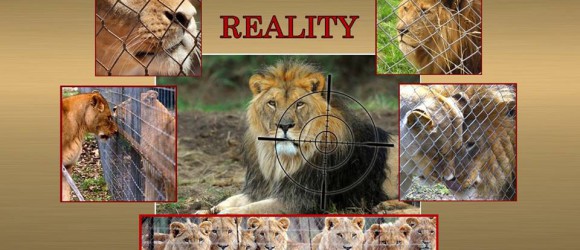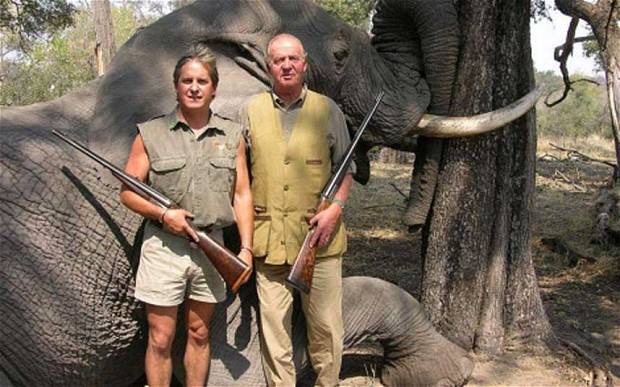WWF Supports Sport Hunting
- At June 23, 2014
- By Rosemary Wright
- In Global Issues
 28
28

WWF Supports Sport Hunting
WWF Supports Sport Hunting – The International Marches For Elephants and Lions was a game changer around the world in that they created an incredible amount of awareness about wildlife sport hunting – and the people and groups who support it as a so-called viable means of animal conservation. Anyone with a brain knows that this argument is as old as the hills and does not pass the muster test. It is reminiscent of their claim that their “sport” is good for local economies – just not true! These hunters cry “crocodile tears” for the animals they murder – as they claim to love their victims.
Bradley Bergh – a former supporter of WWF has written a fabulous letter to WWF and he has kindly given me permission to share in on A Beating Heart.
Guest Writer – Bradley Bergh
WWF Supports Sport Hunting
It has just come to my attention that your organisation supports “sport” hunting as a viable means of wildlife conservation.
I recently read one of your quotes:
“WWF would not openly be supporting the sustainable use of wildlife for the hunting industry as a method for conservation if it did not work.”
I regret that I cannot agree with this. I am not saying this as a knee jerk, emotional reaction. I have been keeping an eye on the hunting industry for some years now and I’m afraid there is no way I can continue to support an organisation that supports hunting for any reason other than ‘survival’. I also don’t believe WWF can know for certain whether it is “a method of conservation that works”.
The “Retiring” King Of Spain With His Kill
I would like to know why I should continue to support your organisation in light of what I have just learnt. Please don’t give me the usual tired justification of how hunters “protect” wildlife against poachers or that hunting brings in “foreign revenue” and “creates sustainable jobs”.
In the first place, in the scores of barbaric video material I have viewed of international “professional sport hunters”, I have yet to observe one hunter that shows any inkling of bravery. They are always surrounded by other “professional sport hunters” who are also armed with heavy calibre, high powered rifles ‘just in case’ things don’t quite go according to plan.
A hunter who hunts with a spear or a knife could be called brave but can we really call the (generally) overweight, privileged business people who feature in these hunting videos (and have to be driven to within striking distance of their prey because they are so unfit) courageous? Please explain how hunters are contributing to the preservation of wildlife and biodiversity or helping to reduce the poaching in this country.
Then there is the argument of job creation and foreign revenue. The usual neo-liberal economic model that involves the enrichment of an elite few, coupled to minimum wages for everyone else. The amount of foreign revenue that flows into South Africa is vague and unsubstantiated and I would really like to hear a factual explanation (rather than the speculative/aspirational version provided by the Department of Environmental Affairs) as to how this income really contributes to building an equitable, humane and sustainable economy.
Most of the wealth in this country is in the hands of a minority and continues to be so as the wealth inequality gap grows ever wider. If WWF is really impartial about this they should do a proper, holistic investigation which examines all the complex factors involved. The hunting industry is merely perpetuating the same business model that many other industries practice in this country which are neither interested in human or animal rights nor the preservation of the environment.
Please don’t respond to this with a whole bunch of academic mumbo-jumbo. I am myself busy with a Master’s in Sustainable Development and am experiencing, first-hand, the enormous limitations of academic study in solving complex problems. I would like to incorporate some of this in my thesis next year but I doubt I will get very far because the little contact I have had with the hunting industry always seems to illicit the same response that resonates with gun ownership lobbyists in the USA – “if you want me to give up my firearm, you will need to pry it from my dead fingers”! I am pretty sure many at WWF know what I am talking about as I have seen how some of the hunting industry players speak and behave.
Perhaps WWF is trying to “constructively engage” with the hunting industry but I do not believe “asking them nicely” is going to change the way they operate. The industry is also inadequately policed as illustrated by the widespread use of canned hunting that is currently taking place in this country. No one really knows what happens out there on those hunts unless the hunter decides to post his video on the internet to brag about it.
Bow hunting is banned in South Africa but look at all the examples of bow kills below. I have the same argument of the SASSI grading system of sustainable fish – the fishing methods may be a bit more “sustainable” but unless the person responsible for the grading is on those boats they have no idea how those fish are really caught and how many other sea animals are killed with clubs and shotguns by fisherman “protecting” their catches. Getting all the role players in the industry to “fill in forms” is no guarantee whatsoever that this is how they operate.
I’m unable to see how we can call ourselves a civilized nation while we continue to condone this. This is not the way advanced societies behave. On the one hand we rant and rave about the number of Rhinos poached each year and on the other hand we allow sport hunters to kill them for pleasure.
The only difference I can see between the two is where the money flows to. I understand WWF has large corporate sponsors and your organisation has to be careful not to offend them but we have to find a way to break the stranglehold corporations have on this country and the world. The first step is to break the financial ties that lead to a conflict of interests.
I have seen how badly many of the animals are killed. The entire system is so complex I am not convinced any study can ascertain the full impact of allowing this to carry on. We continue to allow certain industries to operate in this country (no matter how environmentally destructive those operations may be) because we want to preserve the jobs. What use will jobs be to us once our ecosystem is irreversibly degraded?
I don’t believe anyone working in your organisation truly agrees with sport hunting. In your hearts you know killing for pleasure is barbaric and cannot be justified either economically, morally or for conservation. I cannot help wondering if you have taken this position to keep a large corporate donor happy and I sympathise with your predicament if that is the case.
It takes courage to stand up for what you truly believe in. This is not a choice that involves a colour or taste preference which are merely matters of opinion. An evolved society simply doesn’t allow its members to choose whether or not they can exploit other living creatures for pleasure or entertainment.
WWF should not make it easy for hunters to indulge their addiction to the adrenalin rush of killing! If we want to create just, equitable and humane societies it has to start with the way we treat animals. If we don’t, I cannot see how we can ever expect to achieve it among ourselves.
Just because something is “legal” doesn’t make it ethical. There are more examples of this than I care to mention – including here in South Africa.
Yours faithfully,
Bradley Bergh
A concerned citizen and former WWF donor!
Bradley is meeting with the SA CEO of WWF in June.
PS: “We hunt because we love these animals” – says one hunter. Please explain this to me!



Follow – A BEATING HEART